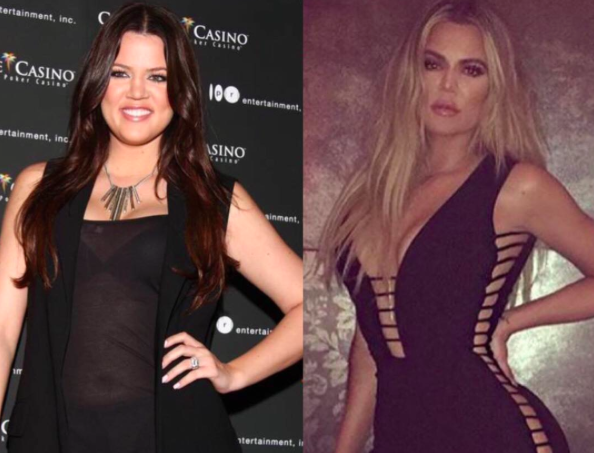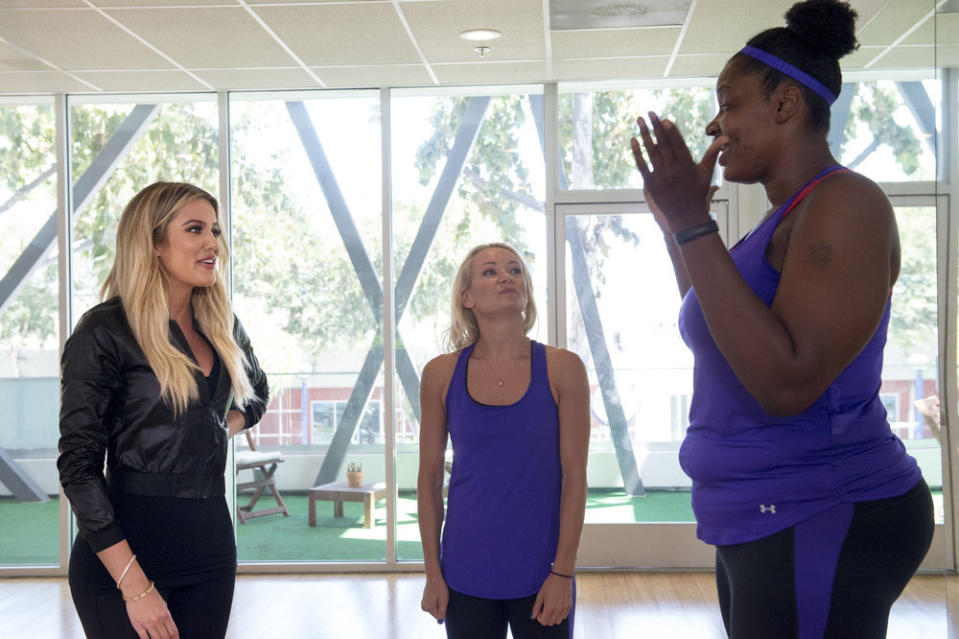Can Khloé Kardashian’s “Revenge Body” ACTUALLY help you get over a breakup? We asked experts.

Let’s be real for a second: Many of us know what it’s like to go through a breakup, feel a whole lot of feelings, and channel those feelings into sweaty, energetic workouts at the gym. It’s a great way to obtain a “high” (endorphins are better than drinking, and don’t typically result in hangover, after all), and since the loss of a partner tends to lead to a whole lot more time to focus on one’s self, breakups and Planet Fitness memberships often go hand in hand.
However, given what we now know about body positivity — about what the constant pressure to obtain a certain type of body can actually do to one’s mental and physical health — do we really need Revenge Body with Khloé Kardashian taking our post-breakup workouts, and making them all about revenge? About losing a crap-ton of weight, fast?
Revenge Body with Khloé Kardashian premieres tonight — and it obviously has its fair share of problems.
Airing Thursdays at 8 p.m. on E!, the series will feature two “heartbroken” contestants an episode getting a makeover, “with the help of a team of Hollywood’s most elite trainers, stylists and glam squads assembled by Khloé Kardashian.”
This may sound like a dream come true for anyone who has recently had their heart broken … but can the show’s reliance on the now-controversial Biggest Loser formula of train long and hard, brutally cut calories, and eventually land a “revenge body” (revealed to family and friends at the end of the episode, of course) lead to healthy changes in its stars and viewers, or does the show’s basic set-up — as well as the messaging coming from Khloé herself — set us up for failure?
Unfortunately, according to multiple experts on health, fitness, and body positivity who are familiar with the show, it’s the latter. Largely because of what the term “revenge body” itself actually connotes.
“I don’t like the term ‘revenge body,'” Rachel Goldman, a practicing psychologist specializing in health and wellness and Assistant Professor of Psychiatry at the NYU School of Medicine, told HelloGiggles, adding that “working out is definitely a form of therapy, but … this suggests that something was wrong with their body to begin with, and doesn’t suggest a sense of body positivity at all. It does suggest that something is wrong with the individual, which then could lead to them thinking that their body caused the breakup.”
The problem with weaponizing health and fitness.
Katie H. Willcox, an author and public speaker as well as CEO of Healthy is the New Skinny and founder of Natural Models LA says that contestants focusing on their bodies as a tool of “revenge” against a former lover, a parent, or a friend can take something very positive — an increased focus on exercise and cleaner eating to “welcome something positive for the future” — and actually end up cheating them out of the mental health benefits of getting healthy.
“You’re doing it all for them instead of doing it for yourself,” she said. “It’s robbing you of those experiences. You did the work, you put in all the effort, you’re supposed to be enjoying the experience, and yet you’re still giving that to someone else who doesn’t value you. Why are you giving them your time, and your thoughts, when you’re doing all of these great things for yourself?
… When you solely focus on someone else who didn’t want to be with you, or was mean to you, you’re almost still in that abusive relationship. You’re living for their approval. That’s just a really unhealthy place to be.”
Willcox also points out that shows like Revenge Body — and Biggest Loser before it — don’t just have the potential to emotionally and sometimes even physically harm contestants (a New York Times study on Biggest Loser contestants found that nearly all of them gained the weight back, thanks to a combination of body science and a lack of proper education on the show), they’re also confusing to viewers at home, who are receiving very distorted messages about what losing weight and getting healthy actually looks like for most people. She specifically recalled the story of a plus-size model she once worked with who had starred on MTV’s I Used To be Fat, but couldn’t keep the weight off “once the trainer left and the pressure of TV wasn’t there.”
A “revenge body” is not sustainable for many people.
Since most viewers watching at home likely cannot afford the world-class trainers and nutritionists employed by E!, NBC, and MTV to deliver such quick, dramatic results to begin with — or afford to work out four to six hours a day, as was the norm on Loser — they’re setting themselves up for major disappointment if they try to emulate what they see on TV, and think it will deliver the same physical results.
“That’s the reality that TV doesn’t show; the yo-yo of it all,” Willcox explained. “It’s unfair to put those people through that, and show society ‘this is something you can do, it’s easy’ — but then when real people work out for a week and eat well for a week and don’t lose a pound, what does that do? What does that trigger?”
Incredibly elated for the premiere of Revenge Body tomorrow!! 8/7c on E
A photo posted by Khloé (@khloekardashian) on Jan 11, 2017 at 2:07pm PST
Additionally, Goldman points out that while exercise has its obvious benefits, it isn’t a one-size-fits-all solution to process a traumatic event like a breakup, or an abusive relationship with a parent, to name just a couple of cases featured on Revenge Body.
“Each individual copes with stressors differently,” she said. “For one individual, focusing on fitness and improving their health may be a great coping mechanism … but it is not for everyone. We need to do what works for us, and sometimes seeking professional help will help you figure that out and/or help you process what is going on beyond what the gym or exercise can do.”
It all circles back to the narrow standards of beauty our society has prescribed over and over again — so casting blame on Khloé isn’t the solution.
Getting a bod deemed “hot” by Western society, it should hopefully go without saying, shouldn’t be used as a band-aid to process trauma, either — especially trauma caused by a relationship with another human being, who probably won’t change how they treat you just because you got skinnier or more muscular. (And if they do, dear god, run!)
“It’s just surface level thinking, that if you change your body your life is going to be better,” Willcox said. “In reality, [the person you’re getting revenge on] probably doesn’t even care.”
The problem, though, lies in the fact that doing things like “seeking professional help” to process trauma and showing “the yo-yo of it all” when it comes to diet and exercise makes for boring television — seeing someone go from plus-size to “revenge body” in the span of a single episode is far more gratifying than slowly watching someone change their health.
“Anything healthy is boring for TV,” Willcox said.
Despite all this, Willcox was reticent to condemn Khloé — who says things like “growing up, people called me the fat, funny sister,” to contestants in the series, adding that she used to revel in her sister Kim’s breakups because Kim has always been considered hot — because “what she’s saying, she really believes,” thanks to a life spent taking in unhealthy messages.
“People on social media were mean to her and would call her the fat sister, and all that shit,” she said. “That’s not reality, but it was her reality.”
Khloé famously dedicated herself to fitness after her painful breakup with Lamar Odom, and ostensibly feels a whole lot better. But as Willcox recalls, Khloé still calls herself “gross” and and laments her sisters’ comparative thinness on recent, post-weight loss episodes of Keeping Up with the Kardashians.
Incredibly elated for the premiere of Revenge Body tomorrow!! 8/7c on E
A photo posted by Khloé (@khloekardashian) on Jan 11, 2017 at 2:07pm PST
When will you know if you’ve succeeded in avenging? What does that even look like?
So where does revenge come in, then, for Khloé? Will it come when Revenge Body is a success, after Kocktails with Khloé was canceled? Will it come with marriage, or with kids, or with finding a business niche like her sisters Kendall, Kylie, and Kim? It’s a complex thing to quantify and qualify.
And since her life — on KUWTK, anyway — already seems to be so full of love, support, and unfathomable financial resources, who does she want to get revenge on, anyway?
A photo posted by Khloé (@khloekardashian) on Jan 9, 2017 at 3:17pm PST
There’s no clean answer to any of these questions, though undoubtedly, watching Khloé figure it all out would be a lot more rewarding — and ultimately, a lot more helpful for viewers at home — than anything we’ll get from Revenge Body. Which is why Willcox hopes that people — especially young girls — who “feel like a piece of shit” when they’re watching shows like this turn them off, and instead dedicate their time and attention not to dramatic weight loss or “revenge,” but to pursuing the sort of balance and self-acceptance we all hope to see Khloé herself one day achieve.
“Right now, it’s all coming down to extremes,” Willcox concluded. “I would love to see girls really detach from that; to have some sense of reality. This is your body and you should value it enough to care for it in a healthy way, and that’s going to be a rollercoaster, it’s going to be up and down, you’re going to always change sizes because that’s life — you change sizes throughout the month as a woman — and it’s about figuring out what works with you, but also realizing you’re so much more than all that. It seems like a simple message, but it’s a lot harder to achieve.”


